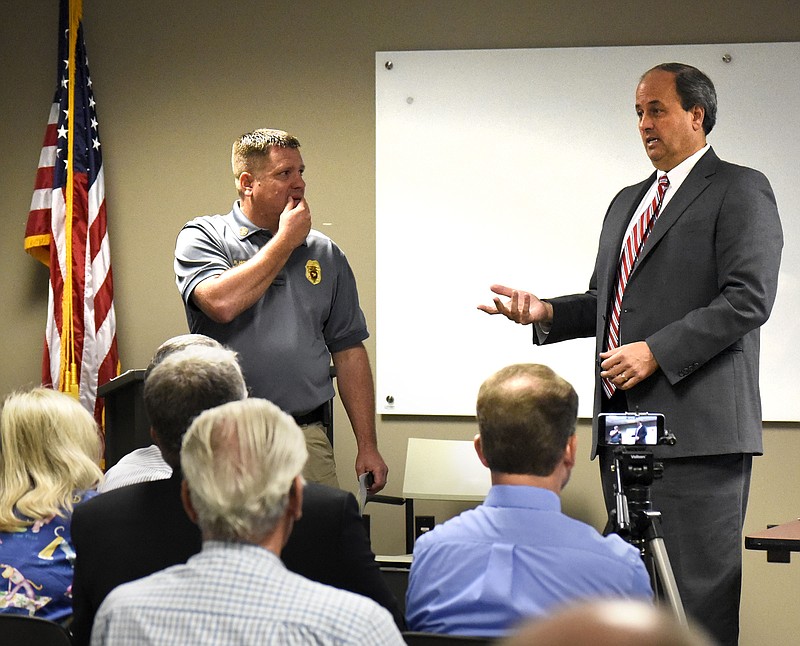Walker County T-SPLOST
› Lifetime: April 1, 2018, through March 31, 2023› Revenue: $3 million per year› Walker County: 75 percent ($2.25 million)› LaFayette: 11.67 percent ($350,100)› Rossville: 6.3 percent ($189,000)› Chickamauga: 3.77 percent ($113,000)› Lookout Mountain: 2.89 percent ($86,100)› Fort Oglethorpe: 0.39 percent ($11,700)
Already absorbing a steep tax hike, Walker County, Ga., voters will decide this week whether to increase the local government's coffers just a bit more.
Commissioner Shannon Whitfield has urged residents to approve a 1 percent sales tax on a referendum Tuesday, the funding going toward road paving and other transportation projects. The Transportation Special Purpose Local Option Sales Tax would bring in about $3 million a year, with the county keeping $2.25 million and its cities splitting the rest.
Whitfield has argued it's the most efficient choice to improve the county's roads. The Georgia Department of Transportation gives the county about $1 million a year for such projects through a grant. But there's a catch: The local government has to provide a 30 percent match to the money the state gives it.
And of the money flowing in from the state, county spokesman Joe Legge said, they have to make use of it within three years. Otherwise, the Department of Transportation pulls it back. And with Whitfield cutting department budgets while setting aside money to pay off debts, there isn't any plan to fund these road projects, aside from Tuesday's vote.
Still, the vote comes at a bad time for Walker County residents, who saw their property tax bills go up by 50-70 percent last month.
Dade County T-SPLOST
› Lifetime: April 1, 2018, through March 31, 2023› Revenue: $1.8 million per year› Dade County: 74 percent($1.4 million)› Trenton: 25 percent ($400,000)
Whitfield also has not released a list of specific projects the money would go toward. He simply projects the county would have $2.25 million more to play with.
"We're trying to figure out which roads need the most attention," Legge said. "And we're going to start prioritizing the roads, once the money goes in."
Walker County is one of two North Georgia local governments putting the transportation sales tax on a referendum this week. Dade County voters also will decide if they want to tack on an extra 1 percent at the cash register. In that case, local government officials predict the tax will bring in about $1.8 million a year, with the county taking 75 percent and the city of Trenton hauling in the other 25 percent.
Compared to Walker County, Dade's elected officials have fleshed out their spending a bit more. Over five years, they expect to bring in $9 million. Their biggest projects? About $5 million to pave some county and city roads. And another $750,000 will build an Interstate 59 exit and entrance north of Trenton.
Dade County Executive Ted Rumley said the odds of voters approving the tax this week are "50-50." Both there and in Walker County, there are no other items up for election - though voters in cities have some council members and commissioners to choose.
"I don't really know," Rumley said, when asked if he thought the referendum would pass. "It's hard to say. There will probably be only 400, 500 people voting. Out of 16,000 [residents]. That's going to be pretty iffy."
In both counties, the new tax would begin April 1 and run for five years. In Walker County, cities will get different slices of the revenue based on the number of county residents in those municipalities. LaFayette would get the second most money, behind the county government. Fort Oglethorpe would get the least, as most of the city's residents live in Catoosa County.
LaFayette City Manager David Hamilton, who would have about $350,000 more to work with each year, said the city council has been committed to transportation improvements. Of the money brought in from another sales tax, Hamilton estimates about 90 percent has gone toward roads projects in the last three years.
The biggest expense was repaving Chattanooga Street. Before fixing the actual street, city workers had to replace a water main and repair three sets of culverts. In all, he said the project cost more than $1 million. But Hamilton said he would welcome the extra funding.
"We haven't sat down and met and said this is what we'll do with the T-SPLOST money," he said. "Unless it passes, that would be a waste of time."
Rossville Mayor Teddy Harris also did not have a list of specific projects ready to go. But the city's public works director, Mark Harris, said the projected $189,000 in revenue going Rossville's way would allow the city to pay for five times as many annual road projects. Right now, the city gets about $40,000 a year in Department of Transportation grant funding.
Mark Harris estimates that about 80 percent of the city's roads need to be repaved. If the vote passes Tuesday, city officials will make a list of roads that need the most work and go to work next year.
"I anticipate lots of paving," the mayor said. "I mean, a lot."
Contact staff writer Tyler Jett at 423-757-6476 or tjett@timesfreepress.com. Follow him on Twitter @LetsJett.
